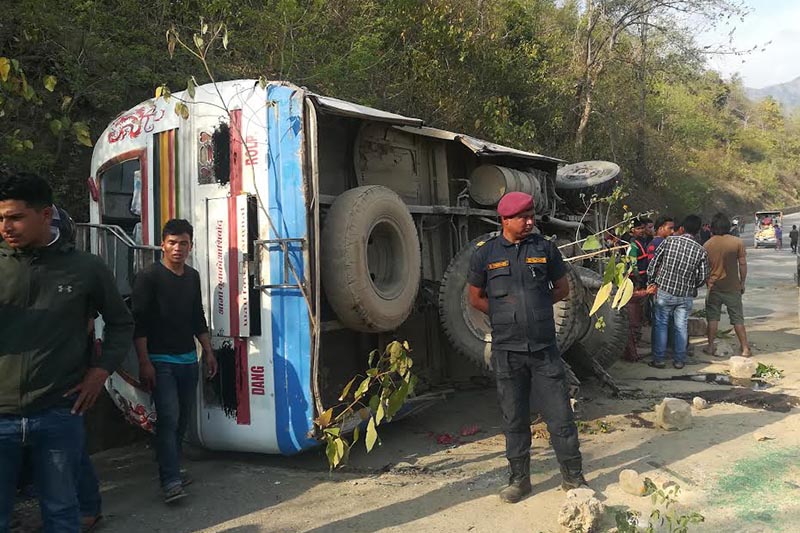Local levels building perilous roads
Kathmandu, July 11
On April 13, a jeep skidded off the road in Doti district and plunged 400 metres into a gorge, killing eight people and critically injuring two. Then on June 18, 15 people were killed in a similar accident when a jeep plunged into the Karnali River in Humla district.
Haphazardly built roads without consultation with engineers were cited as the prime reason for these accidents.
Yet, local bodies have been accelerating construction of roads without fulfilling the basic requirements, primarily hiring an engineer to ensure safety of the roads.
For example, more than 60 dozers have been mobilised in Ramechhap district to dig up roads as per the direction of heads of municipality/village municipality and ward chairs. What is worrisome is that construction works are being carried out without any consultation with engineers.
Dhawa Lama, chairman of Sunapati Rural Municipality of Ramechhap district, cited lack of engineers as the reason for building roads as per the recommendation and demand of the ward chairs and general people.
“We have formed a team comprising representatives of political parties, ward chair and locals to ensure that road construction works are being carried out properly,” reassured Lama. However, he admitted that there were no engineers in the team. This basically means that there is no certain way of ensuring that the roads being built are actually safe.
According to Prabhat Chalise, a former senior engineer at the Department of Roads, such haphazard construction of roads in the name of development will surely result in loss of lives, not to mention economic and environmental damage.
Chalise said before construction of any road, a feasibility study in consultation with an engineer was a must to examine proper gradient, cost effectiveness, environmental impact, soil base and drainage, among other factors.
However, most local bodies have recently accelerated construction of roads with total disregard to safety as they rush to spend the allocated budget of this fiscal, which ends on July 16.
Such haphazard spending and construction works pose a danger to users of roads as well as the environment, warned Dinesh Poudel, a development expert.
Terming the trend as ‘dozer terrorism’ as it is resulting in more destruction than development, Poudel added that lack of oversight mechanism could also result in local bodies becoming a breeding ground for corruption.
Rajeshwor Gywali, spokesperson for the Ministry of Physical Infrastructure and Transport, said that though they were aware of such haphazard construction being undertaken at local levels, there was not much they could do.
“With the decentralisation of authority, construction works at the local levels are no longer under our jurisdiction,” he said, adding, “Which is why the ministry has not formed any oversight mechanism to monitor such kinds of development works.”
In this scenario, local bodies should act more responsibly, said Poudel.
“Development at local levels is crucial for the prosperity of the nation, but it has to be properly planned so that risks can be mitigated,” he said, adding, “After all, what is the point of building such roads that lead to hell?”






